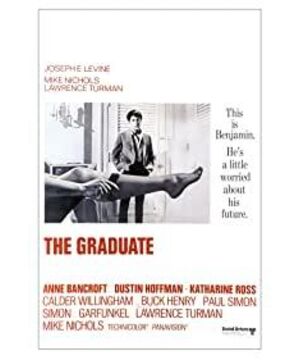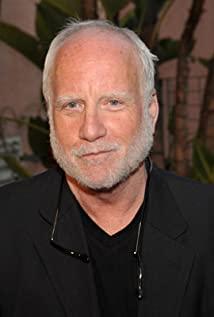On the whole, the plot of The Graduate is very simple, and there are no major ups and downs. The film depicts the confusion and confusion of a graduate who has just stepped into society in a symbolic way. He encounters the emotional temptation of a married woman, Mrs. Robinson, and maintains an improper relationship with her. Well, this is the love in his dreams. After going through ups and downs, he made a difficult choice between temptation and dream. The plot seems very simple today, but it is enduring, and it won the 40th Academy Award for Best Director, the 25th Golden Globe Award for Best Picture, Best Director, Best Actress and Best Newcomer It was also named one of the 100 best films of the century by the American Film Institute. In May 2005, the film was re-screened at the Academy of Film Theater, and the audience's response was still warm and applause. This is a classic. Director Mike Nichols won the Academy Award, but at the time, the film was widely criticized. Some people say that the male protagonist Benjamin is morally depraved and emotionally lost; some people say that Benjamin is decadent and sinking, playing with life; some people say that in the film Benjamin falls in love with both mother and daughter at the same time, both mentally and physically derailed. This is incest and violates ethics... Because of such a plot, the film was banned for 20 years in Taiwan, which was relatively conservative at the time, so as not to have a negative impact on the public. But Frank Pearson, president of the Academy of Motion Picture Arts and Sciences, talked about his feelings when he first saw the film, but said: "It's not enough to say it's impressive, maybe some people think it's influenced an entire generation. Exactly, it's a miracle."
Criticism and miracle? As long as the film is placed in the context of the times in which the story takes place, everything can be understood. The rapid economic growth of the United States in the 1960s brought a period called the "Golden Age" by Western economists and entered a "abundant" society. But what follows at the moment is a rush of sexual liberation, anarchist ideas everywhere. Many people live in a wealthy society. Although the children of the middle class are well-dressed, their spirits are extremely depressed and helpless, and they cannot be properly channeled and vented. They express their inner dissatisfaction through rock, hip-hop, hippie and other behaviors with an emotion of rebelling against the society, all of which have given a huge impact to simple young people. The film "Graduate" uses a real hand to touch and show all this, which more directly expresses the inner tension and conflict of contemporary youth. Just as the Swedish film master Ingmar Bergman said, "It's a mirror, it's a piece of reality", it sees through the confusion, dissatisfaction and helplessness of young American people about social reality at that time, and reflects the society at that time to varying degrees. Question, is a very ironic literary work.
At the beginning of the film, a dialogue between Benjamin and his father gives the audience a preconceived understanding of his inner world: Mr. Brandock: What's the matter with you, the guests are downstairs, Ben, waiting to see you.
Benjamin: Dad, can you explain to them that I'm going to be alone.
Mr. Brandock: They're all good friends of ours, Ben, they've mostly known you since you were born, what's the matter with you?
Benjamin: I'm just...
Mr. Brandock: Anxiety?
Benjamin: Yes...
bu Mr. Randock: Why the anxiety?
Benjamin: Worrying about my future, I think.
Mr. Brandock: What's going on in the future?
Benjamin: I don't know, I think it's become...
Mr. Brandock: How's it going?
Benjamin: (Looking at his father) Becoming... different.
It is obvious that Benjamin, who is hesitant to speak, has been struggling in the sea of mental shackles, even though he has a superior family background and a high education. In his seemingly well-behaved posture, he exposed the depression that he had accumulated for many years, and spread out in confusion. He is not gregarious and would like to be with loneliness as a companion. His relatives and friends couldn't detect it, only his depressed heart was suffering. This mental burden seems to have made him unable to face the future and face life directly. So he chose to escape amid helplessness and melancholy, avoiding the living world, shutting himself in the door, peeping at the outside world through the crack of the door, and sealing the jumping soul. This is revealed to the audience in nuanced detail from the very beginning of the film through long takes. Its protagonist, Benjamin, doesn't know what kind of life he's going to lead, he just knows that he can't invest in the rich and empty life of his parents and their friends. This bewildered and confused protagonist is undoubtedly the first to arouse the strong identification of young moviegoers. The film presents the scene of American society in the 1960s to the audience and touches the soul of modern American society. In the eyes of many viewers, derailment, love, and ethics are just a carrier. A good movie should be one that you don't feel like a movie after watching it.
"Graduate" carries the confusion, hesitation, and helplessness of graduates, which makes many people who have been graduates seem to know and empathize with them. This is indeed a film for young people: directed by young people, made for young audiences, showing young people and new ways of life that are incompatible with tradition; it is directly confronting and exploring social issues. All of this is prevalent in this movie, and many people have a deep understanding of it after watching it, as if it describes the self who was once young or just young. The traditional blood in Benjamin's bones is the backbone of his spirit. Deceived, when he finds himself alone in a room with milfs, smoke-ring-breathing, viciously half-smiling Mrs. Robinson, what we can't help but applaud is Dustin Hoffman's terrific performance: Inner Restraint He was panicked, but he still pretended to be nothing on the surface: "Mrs. Robinson, you want to seduce me, (pause) Are you?" I asked knowingly! Later, with a childish presumptuousness, it actually revealed the cowardice and unease in his heart. Like many fresh graduates, facing the temptation and sins of Vanity Fair, they are both panicked and nostalgic.
It is a good way to be able to obtain physical satisfaction when he is lost in the spirit of not being able to vent. But in any case Mrs. Robinson is his elder, and it is absolutely impossible. He guiltily declined. The film's clever use of wide-screen composition to express the multiple meanings and feelings of a picture - his dull face is stoic and painful in the dusky picture - confronts the charming, charming and approaching Mrs. Robinson. Here the film showcases an artistic approach heavily influenced by French New Wave cinema: from slow motion, stop motion and fast editing, to black and white and color mixing. These techniques not only emphasize the atmosphere, but also remind us that you are enjoying the movie. In the comprehensive artistic effect that combines images, movement and music, what we appreciate is not only the narrative of the story, but also the characterization of characters that is more important than the interpretation of the plot. Benjamin tried his best to escape the emotional temptation Mrs. Robinson had given him with insincere indifference and indifference. The meager sanity was at stake, and was finally cut by Mrs. Robinson with the big scissors of the flesh. Mrs. Robinson, who is scheming, mature, and cautious and empty, is now a beautiful snake to him, drinking the moral sense in his brain, making him abandon all ethical shackles, "painful and happy". In the days of his affair with Mrs. Robinson, Benjamin embodied the characteristics of existentialism: rebellious in spirit and debauchery in behavior. But everything he did was just to dispel the infinite emptiness in his spirit and excrete anguish. His heavy soul was also "creaked" by this illegitimate discharge. The irresistible temptation made him enjoy worryingly amid the pressures of the world and the pleasures of the flesh.
Hollywood movies have never been completely free from sex and violence, but never so candidly and directly. The pleasure of the body is proportional to the burden of the mind. The footage of the tired and lonely Benjamin sitting on the Berkley campus in the film is unforgettable, with the American flag flying high above his head, the flag fluttering warmly in the wind, but from Benjamin's expression, what the audience sees is Abnormal loss, which actually symbolizes the continuous deterioration and final decline of the traditional "American Dream".
Benjamin behaves as described above, and his sense of shame is not completely lost. Knowing that Mrs. Robinson's daughter, Elaine, came back from vacation, in the face of the encouragement and enthusiasm of her parents and Mr. Robinson, he made an appointment with Elaine against his will. With a sense of shame, he deliberately showed Elaine his slutty side, but it didn't help. Yilan's purity and beauty are like a golden key, slowly opening his locked heart. Yilan's sincerity and admiration are like a rag with strong detergency, constantly wiping away his bare loneliness and removing the dust from his heart. The young people in the disordered mind have not given up the pursuit of truth, goodness and beauty here. Yilan and Benjamin are similar in appearance and have a common language. Yilan is Benjamin's dream and a symbol of the dream of young people and graduates. As the Korean director Xu Qinhao said, "I really think it's beautiful, it will definitely not last", Benjamin enjoys a beautiful love with Elaine freely. Such a beautiful thing is also intolerable to Mrs. Robinson. Jealous anger burned inside her. At the same time, it is also inspired by maternal love. Prompting her to show the scars of her heart to her daughter and to demonstrate to her lover. She hopes to salvage the stimulating physical communication with her lover. So, she did not hesitate to destroy the love flowers that her daughter had just bloomed. A vague insight into Benjamin's affair with his mother, the haze shrouded Yilan's heart, which is unbearable for any daughter. A morally despised mother and Benjamin let Elaine's fiery emotions reach a freezing point.
The black background of the film makes people feel embarrassed, and the pure dream has been trampled. When the shady curtain is revealed, the dream can only escape. Heartbroken, Yilan chose a boy she didn't love and hurriedly held a wedding. This also shows the fragility of young people's minds at that time, and they could not stand the blow. Benjamin's once dusty heart has now become pure, and love has washed everything away. The picture of the film gradually faded from the dark yellow and became clearer. He seemed to have finally awakened, feeling that Elaine was his sustenance and future. Endless repentance and introspection made him persistently pursue Elaine's wedding. In the end, love melts everything. The ending is the director's ingenious stroke: Benjamin is like a big spider lying on the church glass and calling to Yilan, this scene is unforgettable. The repeated use of long lenses makes the picture clearer and more gripping. The sound of "Elan" called out his repentance, his love. Elaine's rebellion surprised everyone, and the two rushed out of the church hand in hand and stepped on the bus heading forward. On the bus, they looked at each other and smiled, laughing at the surprised reactions of many passengers looking back and watching, which made people laugh. Although the ending of the reunion is a bit cliché, this ending also gave Benjamin a chance for spiritual baptism, made his dusty soul truly revive, and gave infinite hope to the confused young man. It is also the wish of many kind and compassionate viewers.
But after a short period of stimulation, Benjamin still stared blankly, staring at the endless front. The beautiful bride also restrained her smile. After the joy and hope, she was deeply lost... Looking at their backs through the car window, they separated by a window. Benjamin's blank eyes are the most frequent scenes in the whole film, which makes people think again: Are they really in love? How long can the love last? After resisting reality, can desperately fleeing from the pressure of the entire moral society? The bus is going away, where is the road, and what will the future be for them? Will they be able to keep themselves forever and not be corrupted and assimilated by Mrs. Robinsons in the years to come?
There is no doubt that this is a successful film. The main reason why graduate Benjamin "influenced an entire generation" stems from the editor-director's humanistic care and spiritual observation of the society at that time, his exploration and performance of deep-seated problems in society, and his subjective thinking focused on the film. Soul Ascension. The young Hoffman shot to fame by starring in the film, and he convincingly interprets Ben's growth from infancy to maturity. The famous actress Anne Bancroft also has a very good grasp of Mrs. Robinson. Her performance is tepid, not only without losing the elegance of the middle class, but also with a sophistication and cynicism. There is flavor. When Dustin Hoffman and Anne Bancroft first met in a hotel room, Anne Bancroft had no idea that Hoffman was going to touch her boobs on purpose. Hoffman decided to do it from the distance of a movie camera because it reminded him of his school days, when boys at prom accidentally touched girls' breasts when they were pretending to put on their coats. Director Mike Nichols started laughing behind the camera when Hoffman was doing it in front of the camera and Hoffman started laughing too, instead of stopping the scene, he chose to run away In front of the camera, go to the corner. Hoffman slammed his head against the wall, trying to stop laughing. Nicholas thought it was very interesting, so this part was kept in the movie.
View more about The Graduate reviews











